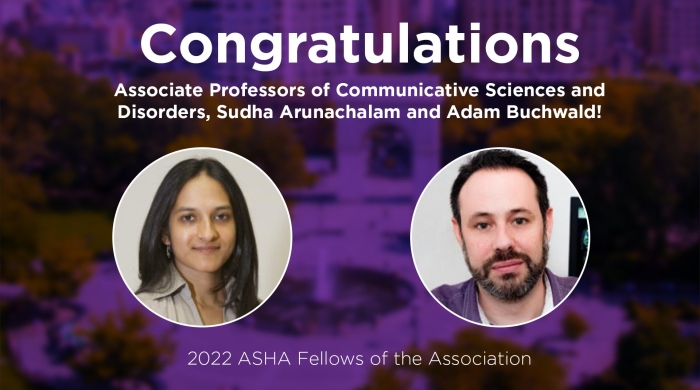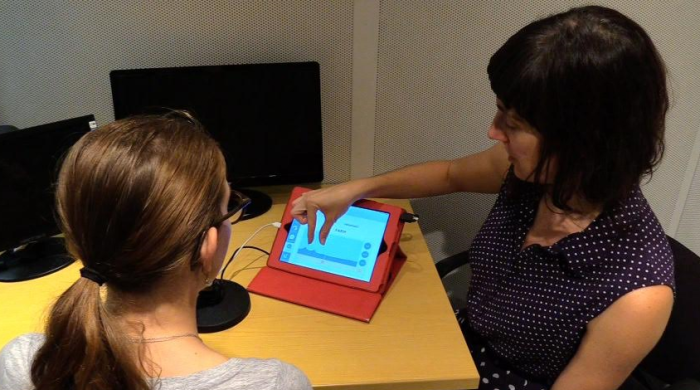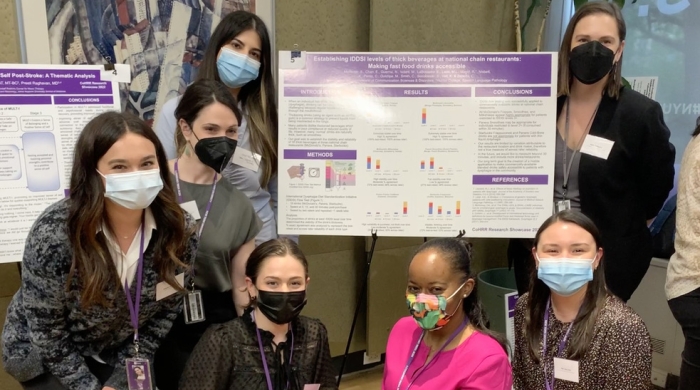NYU’s Department of Communicative Sciences and Disorders (CSD) recently moved into a unified space on the sixth floor of 665 Broadway, complete with faculty offices, data collection rooms, and several research suites featuring state-of-the-art equipment.
“We are delighted to have individualized research space to support the innovative work being conducted in the Department on speech, language, and swallowing,” says Maria Grigos, CSD chair and professor, who designed the space in collaboration with her colleagues. “We recognize the value of having our own, dedicated research hub in a city where space can be difficult to come by.”
In addition to faculty offices, CSD’s new space also includes rooms for research assistants and PhD students to collect, process, and analyze data, as well as greater opportunity to connect with each other and interact with faculty outside of their mentors.
The new research space is really important for us to create the kind of community and inclusive culture we envision.
The research space features a host of specialized equipment that reflects the many foci of the CSD department, from near-infrared spectroscopy (NIRS) and ultrasound biofeedback to investigate speech production mechanisms, to transcranial direct current stimulation (tDCS) to stimulate cortical tissue in the brain regions that support speech production.
A new addition to the space is a high-tech Vicon motion tracking system tied to Grigos’ current research on childhood apraxia of speech (CAS), which is sponsored by the National Institutes of Health (NIH).
“The system uses small, reflective markers that are placed on a speaker’s face to track the movement of their facial structures,” says Grigos. “We use this technology in combination with perceptual judgments and acoustic analysis to study potential changes to the speech motor system over the course of intervention in young children with CAS.”
Sudha Arunachalam and Susannah Levi, both associate professors, also intend to make significant use of the new research space with their five-year NIH training grant to create a six-week summer program for minoritized undergraduates in CSD-related fields, such as psychology, linguistics, neuroscience, and cognitive science.
Launching summer 2023, Summer Health Academic Research Experience in Communication Sciences and Disorders (SHARE-CSD) will invite a cohort of 12 students for an intensive research and professional growth opportunity. The program includes housing, meals, and a stipend, and students will engage not only in hands-on research, but also activities to prepare them for graduate school, workshops to develop their own identity and sense of belonging, and mentorship with faculty across NYU.
“We’re specifically seeking students who might not have intensive research opportunities at their own institutions, and by offering strong financial support we hope that those who might otherwise have to work over the summer won’t miss out,” says Arunachalam. “The new research space is really important for us to create the kind of community and inclusive culture we envision.”
“One of the greatest benefits of the new research space is that there’s more room for everyone to interact and work together – from undergraduates to PhDs to faculty,” says Grigos. “We have a very collaborative department, and this new space opens the door for more organic interaction as we engage students in research and train the next generation of practitioners in our field.”
Related Articles
Two NYU Steinhardt Faculty Named 2022 ASHA Fellows
Congratulations to Sudha Arunachalam and Adam Buchwald, both from Communicative Sciences and Disorders.
Helping People Communicate
Researchers in NYU Steinhardt’s Department of Communicative Sciences and Disorders are tackling high-impact treatment research in a variety of ways, using both innovation and technology to improve quality of life.
Student-Led Project Gives Guidance to Patients with Dysphagia
NYU Steinhardt students conducted virtual research to safely categorize commercially available drinks for patients with swallowing difficulties.



